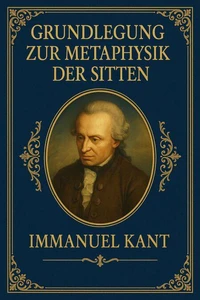The Kantian Ethics: Metaphysics of Morals. Philosophy of Law & The Doctrine of Virtue; Perpetual Peace; The Critique of Practical Reason
Par : , ,Formats :
Disponible dans votre compte client Decitre ou Furet du Nord dès validation de votre commande. Le format ePub est :
- Compatible avec une lecture sur My Vivlio (smartphone, tablette, ordinateur)
- Compatible avec une lecture sur liseuses Vivlio
- Pour les liseuses autres que Vivlio, vous devez utiliser le logiciel Adobe Digital Edition. Non compatible avec la lecture sur les liseuses Kindle, Remarkable et Sony
 , qui est-ce ?
, qui est-ce ?Notre partenaire de plateforme de lecture numérique où vous retrouverez l'ensemble de vos ebooks gratuitement
Pour en savoir plus sur nos ebooks, consultez notre aide en ligne ici
- Nombre de pages529
- FormatePub
- ISBN978-80-7583-771-4
- EAN9788075837714
- Date de parution04/07/2017
- Protection num.Digital Watermarking
- Taille1 Mo
- Infos supplémentairesepub
- ÉditeurMusaicum Books
Résumé
Immanuel Kant's 'The Kantian Ethics: Metaphysics of Morals' delves into the realm of moral philosophy with a focus on the rational foundation of ethics. Kant's work is marked by its rigorous analytical approach and systematic examination of moral principles. Within the book, Kant explores the concept of moral duty, the categorical imperative, and the notion of autonomy in making ethical decisions.
His writing style is dense and philosophical, requiring the reader's full attention to grasp the intricacies of his arguments. This work is a cornerstone of modern moral philosophy, influencing thinkers for centuries to come. It is a must-read for anyone interested in grappling with the complexities of ethics and moral reasoning. Immanuel Kant's background as a renowned philosopher and his keen interest in the nature of ethics and reason led him to develop the Kantian ethical framework presented in this book.
Kant's deep understanding of metaphysics and ethics shines through in this seminal work, making it a timeless contribution to the field of philosophy.
His writing style is dense and philosophical, requiring the reader's full attention to grasp the intricacies of his arguments. This work is a cornerstone of modern moral philosophy, influencing thinkers for centuries to come. It is a must-read for anyone interested in grappling with the complexities of ethics and moral reasoning. Immanuel Kant's background as a renowned philosopher and his keen interest in the nature of ethics and reason led him to develop the Kantian ethical framework presented in this book.
Kant's deep understanding of metaphysics and ethics shines through in this seminal work, making it a timeless contribution to the field of philosophy.
Immanuel Kant's 'The Kantian Ethics: Metaphysics of Morals' delves into the realm of moral philosophy with a focus on the rational foundation of ethics. Kant's work is marked by its rigorous analytical approach and systematic examination of moral principles. Within the book, Kant explores the concept of moral duty, the categorical imperative, and the notion of autonomy in making ethical decisions.
His writing style is dense and philosophical, requiring the reader's full attention to grasp the intricacies of his arguments. This work is a cornerstone of modern moral philosophy, influencing thinkers for centuries to come. It is a must-read for anyone interested in grappling with the complexities of ethics and moral reasoning. Immanuel Kant's background as a renowned philosopher and his keen interest in the nature of ethics and reason led him to develop the Kantian ethical framework presented in this book.
Kant's deep understanding of metaphysics and ethics shines through in this seminal work, making it a timeless contribution to the field of philosophy.
His writing style is dense and philosophical, requiring the reader's full attention to grasp the intricacies of his arguments. This work is a cornerstone of modern moral philosophy, influencing thinkers for centuries to come. It is a must-read for anyone interested in grappling with the complexities of ethics and moral reasoning. Immanuel Kant's background as a renowned philosopher and his keen interest in the nature of ethics and reason led him to develop the Kantian ethical framework presented in this book.
Kant's deep understanding of metaphysics and ethics shines through in this seminal work, making it a timeless contribution to the field of philosophy.










